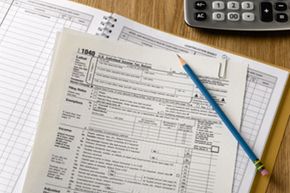 “According to conservative opponents to the Occupy Wall Street movement, only 53 percent of Americans pay income tax. Is this true — and does it matter? See more tax pictures.Jeffrey Hamilton/Getty Images
“According to conservative opponents to the Occupy Wall Street movement, only 53 percent of Americans pay income tax. Is this true — and does it matter? See more tax pictures.Jeffrey Hamilton/Getty Images
In response to the Occupy Wall Street outcry over wealth and income inequality in America, conservative politicians and organizations are quick to point out that the richest Americans pay the largest share of taxes. For example, the top 20 percent of Americans earn 52 percent of the total U.S. income, but pay 87 percent of total income tax [source: Saunders]. To drive the point home, conservatives express shock at the fact that more than half of all Americans pay no federal income tax at all. Occupy Wall Street may be the "99 percent," but let’s give some credit to the "53 percent" who keep the country in business, right? But is this statistic true?
In 2009, according to a memo from the Joint Committee on Taxation, a bi-partisan Congressional committee, only 49 percent of Americans owed money on their federal income tax returns [source: PolitiFact]. So yes, it’s true that more than half of all Americans paid no federal income tax in the tax year 2009, and the number of people who did pay taxes was even lower — 51 percent, not 53 percent. (For tax year 2018, the non-partisan Tax Policy Center estimated that 44 percent would pay no income tax, which means that 56 percent would be paying taxes.)
As with any statement of this nature, there are some qualifiers and distinctions to be made. First of all, these numbers refer to federal income taxes, not all income taxes and withholdings. Most workers have money withheld from each paycheck as mandatory contributions to the Social Security and Medicare trust funds. If you’re self-employed, you pay 15.3 percent of your gross earnings in so-called payroll taxes. If you’re employed by someone else, you pay 7.65 percent and your employer pays the same amount [source: Social Security Administration]. Many workers are also subject to state and local income taxes, property taxes and sales taxes, in addition to federal income taxes [source: Khimm].
That said, why don’t 49 percent of Americans owe any federal income tax on April 15th? There are two main reasons: income level and tax benefits. The tax system in the United States is designed to be progressive, meaning that higher incomes are asked to pay a larger percentage in taxes. If your income level is relatively low, standard deductions and exemptions can quickly lower your tax burden to zero.
Roughly half of Americans who pay no federal income tax do so because they simply don’t earn enough money. The other half doesn’t pay taxes because of special provisions in the tax code that benefit certain taxpayers, notably the elderly and working families with children. For example, the tax code excludes a portion of Social Security income and gives larger standard deductions and tax credits to the elderly. And many working families with children qualify for both the child credit and the earned income tax credit. Together, the elderly and working families with children account for 74 percent of all nontaxable households that aren’t excluded by income level alone [source: Williams].
So who are the 49 percent of Americans who don’t pay income taxes? The vast majority are the lowest income households, the elderly and young working families with children.
Originally Published: Nov 15, 2011
Taxpayers In The U.S. FAQ
How many taxpayers are there in the United States?
As of 2018, which is the most recent data released by the IRS, there were 144.3 million taxpayers in the U.S. that paid individual income taxes of around $1.5 trillion.
What percentage of taxes do the rich pay?
Generally, the rich pay more in the way of income tax than others. In 2018, the top 25 percent of households paid about 87 percent of federal taxes, while the top one percent paid 40.1 percent.
How much does the United States collect in taxes each year?
Revenue collection has been increasing steadily from $1.23 trillion in 2013 to $1.25 trillion in 2015 to $1.5 trillion in 2018.
Does everyone in the U.S. have to pay taxes?
Nearly every American pays taxes once they’re making more than $12,000 a year. However, there are some groups that qualify for tax exemptions, including (but not limited to) not-for-profit organizations, U.S. citizens who work abroad, taxpayers with many deductions and those with many dependents.
Lots More Information
Related Articles
- How Income Taxes Work
- How Federal Taxes Work
- What’s the difference between a flat tax and a fair tax?
- Can tax rebates really prevent an economic downturn?
- Would a fat tax really save lives?
- 10 Death Tax Myths
- How Inheritance Tax Works
- How Tax Brackets Work
Sources
- Khimm, Suzy. The Washington Post. "Conservatives launch ‘We are the 53 percent’ to criticize 99 percenters." October 10, 2011 (Accessed Nov. 6, 2011) http://www.washingtonpost.com/blogs/ezra-klein/post/conservatives-launch-we-are-the-53-percent-to-criticize-99-percenters/2011/10/10/gIQA70omaL_blog.html
- PolitiFact. "John Cornyn says 51 percent of American households pay no income tax." July 7, 2011 (Accessed Nov. 6, 2011) http://www.politifact.com/truth-o-meter/statements/2011/jul/08/john-cornyn/john-cornyn-says-51-percent-american-households-pa/
- Social Security Administration. "Social Security and Medicare Tax Rates." (Accessed Nov. 8, 2011) http://www.ssa.gov/oact/progdata/taxRates.html
- Tax Policy Center. "Current-Law Distribution of Taxes: 2009" (Accessed Nov. 7, 2011) http://www.taxpolicycenter.org/taxtopics/currentdistribution.cfm
- Williams, Roberton. Tax Policy Center. "Why Do People Pay No Federal Income Tax?" July 27, 2011 (Accessed Nov. 6, 2011) http://taxvox.taxpolicycenter.org/2011/07/27/why-do-people-pay-no-federal-income-tax-2/


